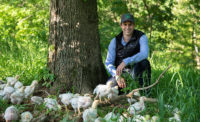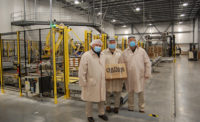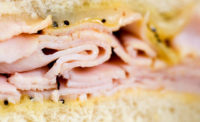On Thanksgiving, many consumers like to think of their turkey as coming straight from the farm. But the reality is more complicated – or automated.
Just like other animal proteins, turkeys have to undergo multiple processing steps before they wind up on grocery shelves or in restaurants. And while the turkey industry may not have generated as many headlines about labor issues during COVID-19 compared to other proteins, it isn’t immune to challenges from the pandemic and has also had to adjust.
“The last 18 months sure have been challenging, and a lot of time has been spent on COVID-19, supply chain issues, and labor challenges,” says Tom Wisvari, director of processing, Cooper Farms, in Van Wert, Ohio. “Because of these events, most processors, including Cooper Farms, are actively looking toward any automation which could eliminate jobs or make them easier.”
For the turkey industry, automation is most likely to be utilized during the first processing stage.
“Automation for the front end of the plant is slowly occurring,” says Rafael Rivera, manager of food safety and production programs for U.S. Poultry & Egg Association (USPOULTRY), based in Tucker, Ga. “There are some components of post-mortem inspection that make it difficult to facilitate implementation.”
Turkey processing is also implementing innovations in stunning. “Gas stunning is being used at some locations, not only for animal welfare needs but also because of improved employee performance and safety,” says Rivera. “There is better data to support the success of this system.”
Indeed, more companies are looking into CO2 stunning. “Cooper Farms, along with most other large processors, has implemented CO2 as the primary means for stunning, and this has certainly allowed us to automate the unloading of the birds and dramatically improved the hanging process,” says Wisvari.
Over the years, Cooper Farms has also added automation in crop removal, oil gland removal, and neck removal, notes Wisvari.
“There are other equipment offerings that we are currently looking at like auto re-hang, auto draw, and auto lung removal,” says Wisvari. “Several large turkey processors currently are using this type of equipment.”
Less automation technology is available for deboning turkeys. “Over the years, we have added processes of semi-automation to help eliminate labor needs and make jobs easier,” notes Wisvari. “We have utilized those lines for years now.”
Recently, Cooper Farms has made improvements in its wing deboning and breast meat trimming operations. “We are actively looking to enhance our dark meat deboning processes, as we see this as the next thing to tackle,” says Wisvari. “Although I indicated the offerings have been few over the years, it does seem as though a lot of equipment vendors are stepping up in this space.”
For further processing, robotics can be a good option. “We have utilized robotics in palletizing of finished products and are currently looking at collaborative robotics for the picking and placing of finished products into their master case,” says Wisvari.
The birds themselves can lead to some challenges with robotics or automation because of the variation in their sizes, weight, and the work environment in which the machinery operates.
For more information, visit the following industry suppliers:
Ultimately, processors will have to ask themselves if the new machines are worth their initial investment. “A lot of the automation is costly, and in most cases, you sacrifice some yield,” notes Wisvari. “Additionally, it can take more specialized technicians to run/maintain the equipment. It seems we are always trying to strike the balance of everything I mentioned above.”
However, as COVID-19 has changed many aspects of our lives, it continues to affect every workplace. And many businesses are taking the opportunity to implement technologies that will make their employee's lives easier in a tough labor market while streamlining their production process.
“I do believe that the world events over the last 18 months does have us re-evaluating how we determine the return on automation investment – placing more emphasis on labor re-allocation and making jobs easier,” says Wisvari. “It will be a primary focus for Cooper Farms in 2022.”





Report Abusive Comment